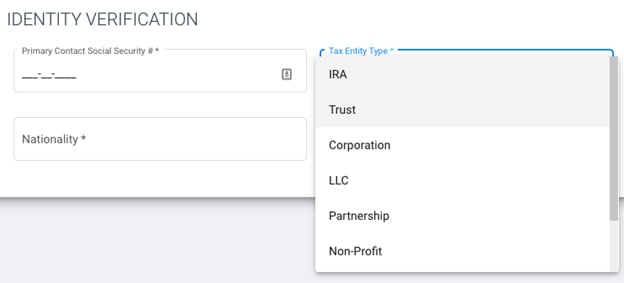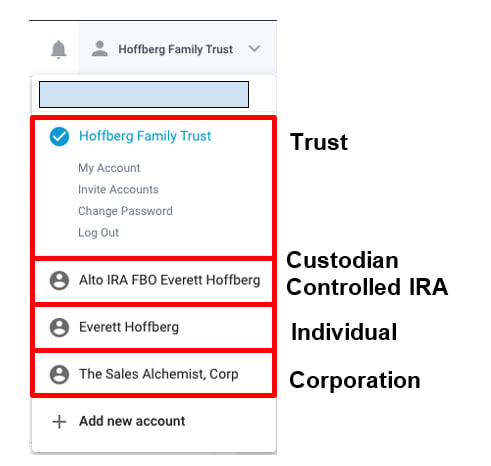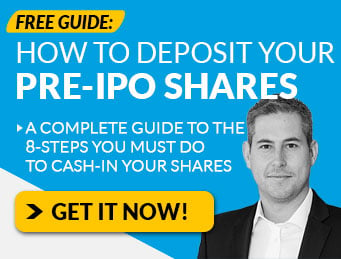Want to use your Trust to invest in private investment opportunities on Equifund? Here’s what you need to know…
| Table of Contents: |
If you’ve ever wondered to yourself, “what happens to my Pre-IPO investments if I die (or get divorced)?”…
Here’s the short answer: with proper planning, your assets will be passed on to the people you want them to go to, and to be used in the way you specify.
But if you don’t?
There’s a good chance the tax man winds up with more of it than you’d like him to…
Your loved ones wind up fighting over your assets (while racking up a massive legal bill for their troubles)…
And the gift you thought would help your family winds up being a point of divisiveness.
That’s why today, we’ll be talking about one of the simplest forms of estate planning…
And the #1 thing you want your family to avoid.
Note: If you already know how Probate, Wills, and Trusts work – and you just want the step-by-step instructions on setting up your Equiifund account to invest using your Trust – click here now.
The Evils of Probate
Before we go any further…
DISCLAIMER: I am not a lawyer and don’t play one on TV. Please do not take anything you’re about to read as legal advice. It is for informational purposes only and should be considered a starting point.
When it comes to estate planning, the starting point of all conversations you have with your advisor is something called Probate.
Probate is a legal process that takes place after someone dies. It includes:
- Proving in court that a deceased person’s will is valid (usually a routine matter)
- Identifying and inventorying the deceased person’s property
- Having the property appraised
- Paying debts and taxes, and
- Distributing the remaining property as the will (or state law, if there’s no will) directs.
Generally speaking, probate sucks and should be avoided because…
It can be expensive.
All legal fees must be paid before your any of your heirs get what you’ve left them.
To make things worse, if you own property in other states, your family could face multiple probates, each one according to the laws in that state.
OUCH!
It takes time.
The American Bar Association (ABA) estimates the timetable at six to nine months for the average estate… but it can also go longer, especially if there is a contested estate.
During part of this time, assets are usually frozen so an accurate inventory can be taken.
Nothing can be distributed or sold without court and/or executor approval.
This means if your family needs money to live on, they must request a living allowance, which may be denied.
Your family has no privacy.
Probate is a public process.
This means the court is required to post notice so any “interested party” can see what you owned, whom you owed, who will receive your assets and when they will receive them.
This is a great way to tell creditors, angry exes, and entitled relatives they can now make claim to what rightfully belongs to your family.
Your family has no control.
Have you ever gone to the doctor and had no idea what it’s going to cost or how long it will take? Probate is like that, but worse.
You family will have no idea how much it will cost, how long it will take, and what information is made public.
This is why wealthy people do everything they can to avoid having their property go through probate.
They want to make sure their loved ones – or the charitable causes they care about – get everything they’re supposed to… WITHOUT having to deal with some drawn out legal process.
Broadly speaking, there are two main ways wealthy people accomplish this goal.
Wills and Trusts
You probably know you should have a will… but you might not know exactly what it can do and what it can’t do.
A will is a document that states your final wishes.
It is read by a county court after your death, and the court makes sure that your final wishes are carried out.
Most people use a will to leave instructions about what happens with their property after they die. But it can also be used to…
- Name guardians for children and their property.
- Decide how debts and taxes will be paid.
- Provide for pets.
Contrary to what you’ve probably heard, a will may not be the best estate planning tool for you and your family.
The main reason is – of course – probate; a will does not avoid probate when you die.
In fact, for a will to be valid, it has to go to probate before it can be legally enforced.
Also, because you have to die in order for your will to go into effect… it provides no protection if you become physically or mentally incapacitated.
This means the court could potentially take control of your assets before you die if you don’t have proper directives in place.
Fortunately, there is a simple and proven method common in estate planning: a revocable trust (also known as a “living trust”).
A revocable trust is a legal document that – just like a will – contains your instructions for what you want to happen to your property when you die.
It also allows you to maintain control of your assets during your lifetime. You can change or dissolve a revocable trust if necessary. This is why they are “revocable” trusts — you can “revoke” them.
For example, if you go through a divorce or acquire new assets, you may need to update the terms of the trust to reflect the consequences of those events
But here’s the important difference between a revocable trust and a will…
When you set up a revocable trust, you transfer assets from your name to the name of your trust, which you control — such as from “Joe and Jackie Smith, husband and wife” to “Joe and Jackie Smith, trustees under trust dated (month/day/year).”
Legally you no longer own anything. Instead, your trust does.
This means when you die, there’s nothing you “own” that needs to go through probate.
The concept is simple, but this is what keeps you and your family out of the courts.
It may also solve a lot of the problems a will does not.
For example…
- Saving money. The fewer assets that need to go through probate means fewer potential legal fees.
- Control of your wealth. You get to decide exactly when, and to whom, your assets go to… even when there are complex situations such as children from more than one marriage.
- Protecting your legacy. A properly constructed trust can help protect your estate from your heirs’ creditors or from beneficiaries who may not be adept at money management.
- More privacy. Probate is a matter of public record; a trust helps your assets to avoid probate and pass to your heirs privately.
Not only does it avoid probate, this structure can give you far more control over your assets, both while you’re living and upon your death.
For example, you can:
- Put conditions on your gifts. (i.e. I give my house to my daughter if she finishes college)
- Leave instructions for final arrangements (i.e. I want these funds to be used to commission a 10 foot tall statue of me riding a horse).
- Leave property for your pet.
- Make arrangements for money or property that will be left another way. (i.e. Property in a trust or property for which you’ve named a pay-on-death beneficiary.)
Now, there’s a LOT of different trusts you can set up, and each has its own special features, benefits, and drawbacks; Here is a very high level overview.
Other types of trusts
| Marital or “A” trust | Designed to provide benefits to a surviving spouse; generally included in the taxable estate of the surviving spouse |
| Bypass or “B” trust | Also known as credit shelter trust; This is a type of irrevocable trust that transfers assets directly from one spouse to another at the time of the first spouse’s death. When the surviving spouse dies, any remaining assets goes to their beneficiaries, free of estate tax. |
| Charitable lead trust | Allows you to earmark certain assets for a specific charity or charities, with the rest of your assets going to your beneficiaries when you pass away |
| Charitable remainder trust | Allows you to receive an income stream for a defined period of time and stipulate that any remainder go to a charity |
| Generation- Skipping trust |
This type of trust lets you pass assets to your grandchildren, allowing your children to avoid paying estate taxes on those assets in the process. At the same time, you still have the option to allow your children access to any income that the assets generate. |
| Irrevocable Trust | Once you established, you cannot change or modify it in any way. One main benefit is the ability to remove certain assets from your estate, sheltering them from estate and gift tax. |
| Irrevocable life insurance trust (ILIT) | You designate the trust as the beneficiary of your life insurance policy; when you die, the policy proceeds go into the trust. The advantage of an ILIT is that it allows you to avoid estate taxes on life insurance payouts. |
| Special Needs Trust | This trust is used to help financially provide for a special needs dependent, such as a child, sibling or parent – without compromising their ability to receive government benefits for their disability. The money in the trust allows them to pay for medical care or day-to-day needs while also allowing them to remain eligible for government benefits. |
| Spendthrift Trust | Concerned about your heirs frittering away their inheritance? This type of trust allows you to specify when and how principal trust assets can be accessed by the trust beneficiaries. |
Please talk to an estate planning attorney about your specific needs.
Final Thoughts
If you’re not excited about pondering your eventual death – and what happens to your assets after – welcome to the club.
But if you’re in the position of “head of household” or “steward of family wealth,” you owe it to the people (and causes) you care about to have a plan in place.
If you’re in a situation where you’ve already made an investment and you’d like to add a beneficiary, you will need to contact the transfer agent for each investment you have.
However, because investment products are regulated, there are certain safeguards and protections in place designed to reduce or eliminate fraud when it comes to changing ownership.
To help you navigate this process, we put together this free guide called How to Retitle Your Pre-IPO Shares.
As always, please consider talking to a qualified estate planning attorney to help you with your own individual needs.
How to invest in Equifund deals using your Trust
Before we begin…
As part of our AML/KYC compliance policies, we must verify the Trust is in good standing.
At the very last step of the account creation process, you will need to upload the following documents before we can process any investments made from your Trust investment account.
- Trust Agreement (or Trust Deed): This is an estate planning document that allows you to transfer ownership of your assets to a third party.The Grantor is the person (i.e you) who created the Trust. A Trustee is a person who acts as a custodian for the assets held within a Trust.
- Proof of address dated within the last 90 days (i.e. bank statement).
I’m also going to assume that you’ve already set up your individual profile. If you haven’t, please go here to for a walkthrough.
Once you’ve set up your individual account, you can add additional accounts to your profile.
To do this, click on the down arrow in the upper right hand corner next to your name (1), then hover your mouse over the “+Add New Account” field (2), then click “Entity” (3).
Once you do, you’ll be taken to a screen that looks like this:
Please enter your first name, last name, and title exactly as it appears on your trust documentation (i.e. the Trust Agreement).
You will also need to enter your phone number and date of birth.
For the section marked “Entity Information,” please enter the entity name, address (cannot be a P.O. Box), state/region of formation, and country, exactly as it appears on your trust documention
If for any reason, you’d like to create a separate login/password to access any additional investment accounts, you can check the “Create a password for this account user.”
Once you’ve done this, the screen will refresh and you will be taken to the homepage of your new account. You will still need to enter some additional information to complete the setup process.
The Contact Information and Entity Information will already be populated. You will need to complete the section marked Identity Verification.
Please note that any information you entered from your “Individual Account” will not transfer to this one.
This means you will need to re-enter your social security number, nationality, and country of residence.
You will also need to specify the Tax Entity Type.
Please select “Trust” from the drop down menu.
To confirm the additional account has been set up, hover over the upper right hand corner.
You can switch back and forth between all of your accounts from this menu.







